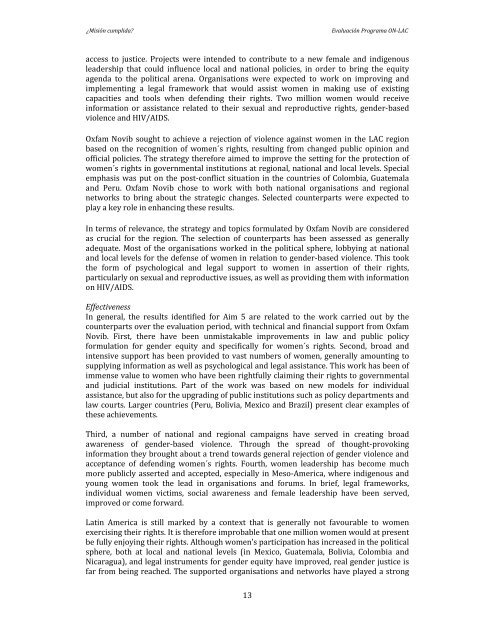¿MISION CUMPLIDA? EVALUACIÓN DEL PROGRAMA DE ... - Novib
¿MISION CUMPLIDA? EVALUACIÓN DEL PROGRAMA DE ... - Novib
¿MISION CUMPLIDA? EVALUACIÓN DEL PROGRAMA DE ... - Novib
Create successful ePaper yourself
Turn your PDF publications into a flip-book with our unique Google optimized e-Paper software.
¿Misión cumplida? Evaluación Programa ON-LAC<br />
access to justice. Projects were intended to contribute to a new female and indigenous<br />
leadership that could influence local and national policies, in order to bring the equity<br />
agenda to the political arena. Organisations were expected to work on improving and<br />
implementing a legal framework that would assist women in making use of existing<br />
capacities and tools when defending their rights. Two million women would receive<br />
information or assistance related to their sexual and reproductive rights, gender-based<br />
violence and HIV/AIDS.<br />
Oxfam <strong>Novib</strong> sought to achieve a rejection of violence against women in the LAC region<br />
based on the recognition of women´s rights, resulting from changed public opinion and<br />
official policies. The strategy therefore aimed to improve the setting for the protection of<br />
women´s rights in governmental institutions at regional, national and local levels. Special<br />
emphasis was put on the post-conflict situation in the countries of Colombia, Guatemala<br />
and Peru. Oxfam <strong>Novib</strong> chose to work with both national organisations and regional<br />
networks to bring about the strategic changes. Selected counterparts were expected to<br />
play a key role in enhancing these results.<br />
In terms of relevance, the strategy and topics formulated by Oxfam <strong>Novib</strong> are considered<br />
as crucial for the region. The selection of counterparts has been assessed as generally<br />
adequate. Most of the organisations worked in the political sphere, lobbying at national<br />
and local levels for the defense of women in relation to gender-based violence. This took<br />
the form of psychological and legal support to women in assertion of their rights,<br />
particularly on sexual and reproductive issues, as well as providing them with information<br />
on HIV/AIDS.<br />
Effectiveness<br />
In general, the results identified for Aim 5 are related to the work carried out by the<br />
counterparts over the evaluation period, with technical and financial support from Oxfam<br />
<strong>Novib</strong>. First, there have been unmistakable improvements in law and public policy<br />
formulation for gender equity and specifically for women´s rights. Second, broad and<br />
intensive support has been provided to vast numbers of women, generally amounting to<br />
supplying information as well as psychological and legal assistance. This work has been of<br />
immense value to women who have been rightfully claiming their rights to governmental<br />
and judicial institutions. Part of the work was based on new models for individual<br />
assistance, but also for the upgrading of public institutions such as policy departments and<br />
law courts. Larger countries (Peru, Bolivia, Mexico and Brazil) present clear examples of<br />
these achievements.<br />
Third, a number of national and regional campaigns have served in creating broad<br />
awareness of gender-based violence. Through the spread of thought-provoking<br />
information they brought about a trend towards general rejection of gender violence and<br />
acceptance of defending women´s rights. Fourth, women leadership has become much<br />
more publicly asserted and accepted, especially in Meso-America, where indigenous and<br />
young women took the lead in organisations and forums. In brief, legal frameworks,<br />
individual women victims, social awareness and female leadership have been served,<br />
improved or come forward.<br />
Latin America is still marked by a context that is generally not favourable to women<br />
exercising their rights. It is therefore improbable that one million women would at present<br />
be fully enjoying their rights. Although women’s participation has increased in the political<br />
sphere, both at local and national levels (in Mexico, Guatemala, Bolivia, Colombia and<br />
Nicaragua), and legal instruments for gender equity have improved, real gender justice is<br />
far from being reached. The supported organisations and networks have played a strong<br />
13



